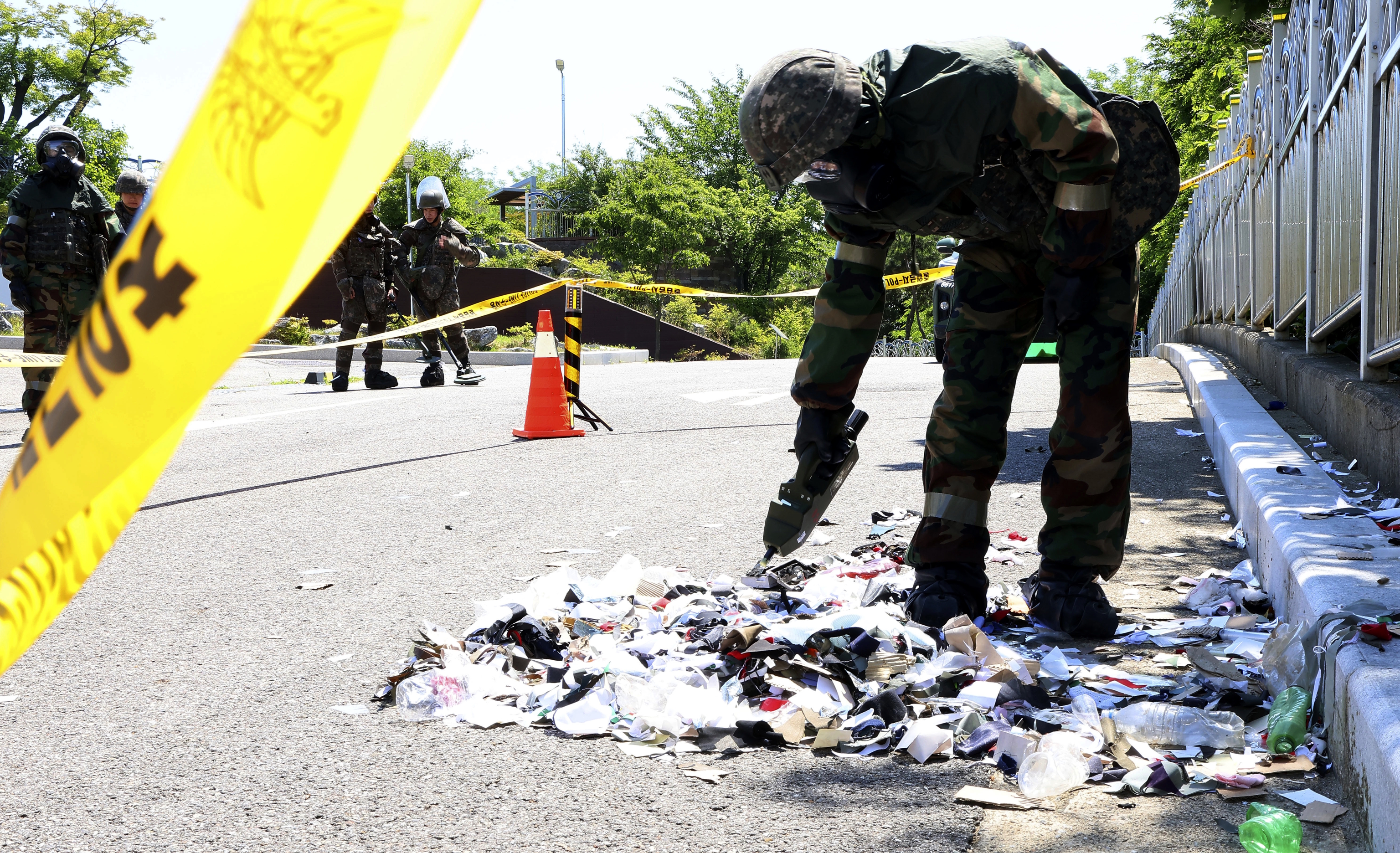Experts say if South Korea resumes live-fire drills or anti-Pyongyang propaganda broadcasts via loudspeakers in border areas, that's certain to infuriate North Korea and may prompt it to take its own provocative countermeasures along the border.
Here's a look at North Korea's balloon launches:
Since May 28, North Korea has sent about 1,000 balloons carrying all kinds of trash across the border. No hazardous materials were found, but South Korean social media was still abuzz with worries that North Korea might use balloons to drop chemical, biological and other weapons next time.
After the first wave of balloons, Kim Yo Jong, the influential sister of North Korean leader Kim Jong Un, said they were deployed to make good on her country's threat to "scatter mounds of wastepaper and filth" in South Korea, in reaction to previous South Korean campaigns by private citizens sending balloons with items to North Korea.
Kim Kang Il, a North Korean vice defense minister, said Sunday the North would halt its balloon campaign because it left the South Koreans with "enough experience of how much unpleasant they feel."
South Korean civic activists have steadfastly launched their own helium-filled balloons to drop anti-Pyongyang leaflets and USB sticks with South Korean dramas and world news in North Korea, where most of its 26 million people have no official access to foreign news. Enraged, North Korea has previously fired at South Korean balloons and destroyed an empty, South Korean-built liaison office in the North.
South Korea's military didn't shoot down the incoming North Korean balloons to avoid potential damage on the ground and an unwanted armed clash with the North.
It has instead decided to suspend a 2018 military agreement with North Korea to bolster its military readiness along the border. The agreement — reached during a brief period of inter-Korean rapprochement — requires the two Koreas to cease all sorts of hostile acts against each other at border areas, including firing exercises, aerial surveillance and psychological warfare.
The deal has already been in limbo, with both Korea taking some steps in breach of it amid tensions over North Korea's spy satellite launch last November. South Korea says the deal's suspension would still formally allow it to restart front-line military drills and take swift, effective responses to North Korean provocations.
"The responsibility for this situation lies solely with North Korea. If North Korea launches additional provocations, our military, in conjunction with the solid South Korea-U.S. defense posture, will punish North Korea swiftly, strongly and to the end," Cho Chang-rae, South Korea's deputy defense minister for policy, said.
At the center of media attention is whether South Korea will resume blaring anti-Pyongyang broadcasts, K-pop songs and outside news from its border loudspeakers. North Korea is extremely sensitive to such broadcasts because they could demoralize front-line troops and residents and eventually weaken leader Kim Jong Un's grip on power, experts say.
In 2015, when South Korea restarted loudspeaker broadcasts for the first time in 11 years, North Korea fired artillery rounds across the border, prompting South Korea to return fire, according to South Korean officials. No casualties were reported.
North Korea's balloon campaign was among a series of provocations directed at South Korea recently. In past days, North Korea also test-fired a salvo of nuclear-capable weapons in a drill rehearsing a preemptive strike on South Korea, and allegedly jammed GPS navigation signals in South Korea.
Broadly, North Korea has ramped up weapons tests and toughened warlike rhetoric in recent years in what observers call a bid to boost its leverage in future diplomacy with the U.S. and South Korea. But experts say the North's latest steps were particularly designed to trigger a divide in South Korea over its government's tough policy on North Korea.
The South Korean government's decision to suspend the 2018 deal invited criticism from opposition liberal lawmakers and activists, who espouse greater ties with North Korea. But it's unclear how influential their voices are, after the trash-carrying balloons deepened anti-North Korea sentiments in the South.
South Korean officials have no legal grounds to ban civilians from sending balloons with leaflets to the North. In 2023, the South Korean Constitutional Court struck down a contentious law that criminalized anti-Pyongyang balloon flying. The court called the law an excessive restriction on free speech.
Park Sang-hak, a North Korean defector-turned-activist well known for his long-running leaflet campaigns, said he won't back down in the face of the North Korean threats.
"We've sent North Korea the truth and love, medicines, one-dollar bills, dramas and songs, but they sent us garbage and filth?" Park said in a statement. "We defectors will act ... We'll send our North Korean compatriots the truth and love."
North Korea has warned it will resumed its balloon activities if South Korean activists fly their balloons again.
"I will just say that it's obviously quite a disgusting tactic — irresponsible, childish — and it should come to an end," U.S. State Department spokesperson Matthew Miller said Monday over the North's balloon launches.
